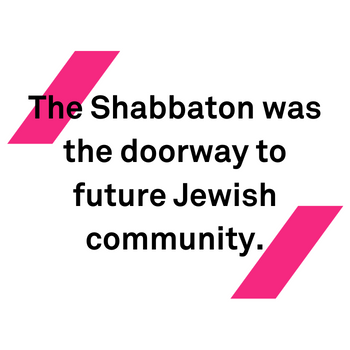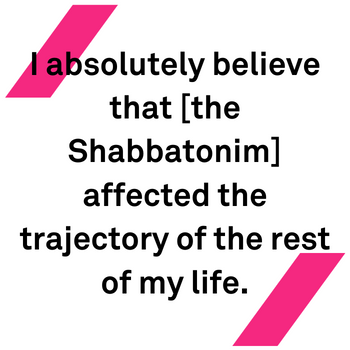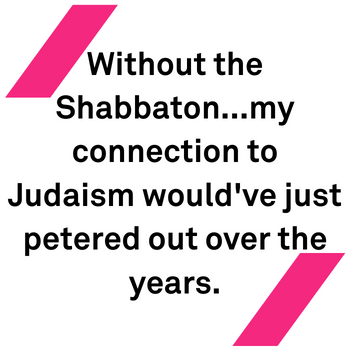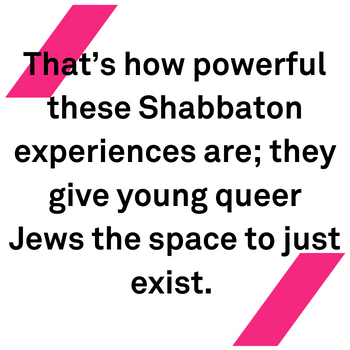

Keshet: What was the Keshet Shabbaton community like?

Skyler: Even though we had different backgrounds, we were deeply emotionally invested in the same issues. I was really excited about meeting other queer Jews and to be around people with similar experiences. It was a safe space – a space where everybody is thinking about the same intersections, even if it impacts each of us a bit differently.
It was a crash course in Jewish community for me, because I didn’t have that growing up. So I just immersed myself. The Shabbaton was the doorway to future Jewish community.
Keshet: What was going on for you at that point in your life?
Skyler: Well, I was 16 years old, housing insecure, and had only recently converted to Judaism, so I was exploring what my observance was going to look like. I didn’t have a lifetime of trying different things on and seeing what felt comfortable, so having different possibility models, like having Y-Love or having the rabbi there, and having different denominational models, made me feel supported as a young, queer Jew to explore my own relationship to Judasim.
Keshet: Tell me a little bit about what’s gone on for you since then…
Skyler: I’m married! My wife and I had a Jewish wedding, and my wife is pregnant, so that’s really exciting!
Keshet: Oh, mazal tov! That’s amazing. Congratulations.
Skyler: My wife is actually finishing the process of her conversion to Judaism right now, so that’s been nice. It’s special to watch her go through the journey a little over 10 years after I did it. It’s a unique perspective, getting to see her learn and read some of the same books I read when I was first converting. For work, I’m an administrator at a preschool. I love what I do. I’m also earning my Master’s in Public Health through the University of Missouri.
Keshet: What impact has Keshet had on your trajectory?

Skyler: The adults [I met at the] Shabbaton were key [for me]. I was actually emancipated at 16, and I had been living on my own for a couple years. And when people at that age are in that position, it’s possible to be around the wrong types of people. I tell my wife all the time that I was so fortunate to have always come in contact with the right types of adults through the Shabbatonim who really cared about my wellbeing and my future success, and who always had an eye out for me. And I absolutely believe that affected the trajectory of the rest of my life.
Keshet: It’s amazing to have a community of people looking out for you.
Skyler: It really is. I feel that any Jewish engagement, especially Jewish queer engagement, is so important because it keeps that connection alive. I’ve always felt that Judaism is a verb, you know? It’s not about a one day transformation: it’s about the action and repeated actions.
Keshet: What do you think would be different in your life had you not been involved with Keshet at that time?

Skyler: I’m concerned that I wouldn’t feel as connected to my Judaism. I think back to immediately after I converted, when I started actively practicing Judaism and engaging in the rhythm of Jewish life, and the Shabbaton was a significant part of that. I got to meet people, to celebrate Shabbat together, to do it again the next year, and go on to experience Jewish holidays together. I didn’t have any of that before. Without the Shabbaton as a launching point at the beginning of my Jewish life, I’m concerned that – 10 years in – my connection to Judaism would’ve just petered out over the years.
Keshet: Is there anything else from your experience that you’d like to share?

Skyler: So, at the time, I had a boyfriend and I told him about what an amazing experience I had at the Shabbaton. He had a Jewish dad but wasn’t raised in a very observant or practicing home, so he was interested in exploring his Judaism. He came with me to the second Shabbaton and ended up becoming more involved Jewishly. It was a ripple effect. That’s how powerful these Shabbaton experiences are: they give young queer Jews the space to just exist. We’re not islands. We have little networks in and of ourselves and that brings even more people in, and isn’t that what we want? How could that be anything but wonderful?
If you could share one piece of advice or message with today’s Shabbaton participants, what would you tell them?
Skyler: When I first went to the Shabbaton I was a bit nervous because I didn’t come from a Jewish family (I was a convert), I came from a different region of the U.S., I had a very different life experience/family structure, a different socio-economic situation, was the only out trans man, etc. But [when I got there] I realized that none of that really mattered: The drastically different ways we related to our Judaism and embodied our queerness were all just things to joyfully discover together. I hope that for future Shabbaton participants that they don’t go into the experience expecting to meet people “just like” themselves, but rather people who have grappled with similar questions and who are excited to build the future of queer Jewish spaces together.
Skyler Clarke (he/him) is an Education Administrator and Master’s in Public Health student at the University of Missouri. He currently lives with his wife in Long Beach, California.
Back to 10 Years of Keshet Shabbatonim.